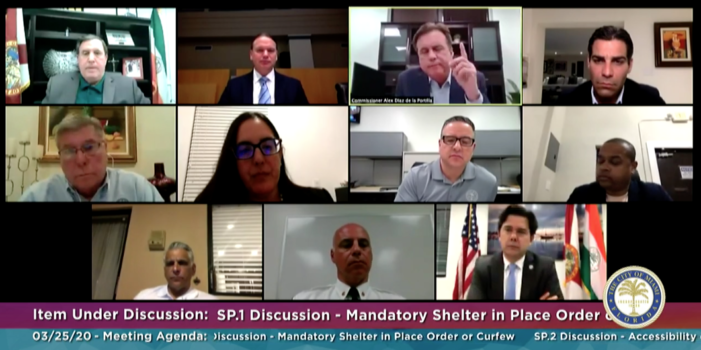The Miami city commission met virtually Wednesday via a Zoom video conferencing platform that allowed the public to participate in a one-way sort of manner — through emails, video recordings and voice recordings played during the meeting — and where commissioners voted unanimously to create a 10 p.m. to 5 a.m. COVID19 curfew starting Friday.
Now city police are armed with more than “just the power of suggestion,” said Chief Jorge Colina, 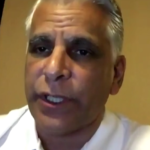 who added that violators could be fined $500 or jailed up to six months. “That would be a last resort,” he said, adding that the curfew gives cops the ability to be “more forceful” with anyone who is “blatantly ignoring” the rules. Hopefully, that won’t be directed toward any one group.
who added that violators could be fined $500 or jailed up to six months. “That would be a last resort,” he said, adding that the curfew gives cops the ability to be “more forceful” with anyone who is “blatantly ignoring” the rules. Hopefully, that won’t be directed toward any one group.
“For the most part, people are adhering to the rules,” Colina said, adding that administrative, training and internal affairs officers were put on the street to beef up patrols. One botanica — a store that sells medicinal herbs and potions as well as religious artifacts and icons — thought they were an essential business, until the police explained that they weren’t covered, Colina said.
Read related: Corrections officers may have carried COVID19 in Miami-Dade courtrooms
Commissioners also decided to spend $2 million feeding the elderly and the poor — although for a while it seemed the poor would go hungry because of a technicality — and talked about expanding testing to more sites, and more people. Commissioners may even dip into the city’s $74 million of reserves to help them get through this pandemic.
The long meeting started like an episode of the Brady Bunch or Celebrity Squares: With a tic-tac-toe of city officials from different places on the board. Mayor Francis Suarez was still at home, under quarantine for testing positi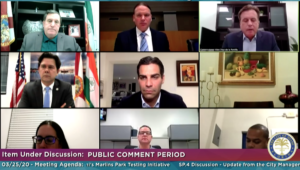 ve for COVID19 twice, where he was seen dashing off the screen several times and returning at least once with popcorn. Yes, popcorn.
ve for COVID19 twice, where he was seen dashing off the screen several times and returning at least once with popcorn. Yes, popcorn.
Commissioner Manolo Reyes, who looked like he was in his dining room — when he was there because he and the mayor ducked out a lot — wore headphones and Ladra bets it’s because his wife didn’t want to hear the bickering. Commissioners Joe Carollo, Alex Diaz de la Portilla and Ken Russell were in their respective offices at City Hall. You could tell by the flags in Carollo and Russell’s office. DLP has no flags, but there was a big piece of furniture that looked like it was going to fall on top of him at any minute. Commissioner Keon Hardemon looked like he was in time-out in the utility room of an industrial laundromat or something. City Clerk Todd Hannon was actually braving commission chambers and City Manager Art Noriega — looking like hasn’t slept in days and might fall asleep at any moment — might have been back at the MPA, with a city polo that matched the cubicles. And City Attorney Victoria Mendez — looking very Wednesday in black — was probably coming live to us from the Miami River Center because those ugly metal blinds can’t possibly be at her house.
This can legit become a drinking game if (read: when) they do it again. The object of the game is to take a shot every time “Tricky Vicky” drinks from her red solo cup or each time Hardemon touches his face or every time Reyes leaves the room or every time Diaz de la Portilla shows his teeth. It really could work with so many different tics and habits.
Read related: Miami Lakes and Zoom can help governments meet virtually, publicly
Russell needs a haircut. But he was right to insist that children and poor working families who live paycheck to paycheck and have no jobs now get some assistance from the city, too. Ladra agrees. The first and number one job of any government is to provide security. And right now people are feeling food insecurity. The role of government is to provide that food to provide people with that security, no matter how old they are, no matter what frailty they have.
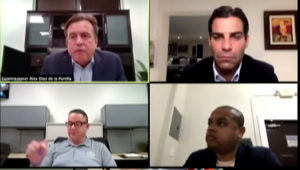 The city had only earmarked $1 million for elderly meals and Diaz de la Portilla wants the allocations to be divided by district according to the poverty level of those 60 and over, not the general poverty level, which means — what a surprise — Russell’s district and Hardemon’s district will likely get less of the allocation and the Three Amigos get more for their districts.
The city had only earmarked $1 million for elderly meals and Diaz de la Portilla wants the allocations to be divided by district according to the poverty level of those 60 and over, not the general poverty level, which means — what a surprise — Russell’s district and Hardemon’s district will likely get less of the allocation and the Three Amigos get more for their districts.
Russell was fine with that. But he wanted another million to go to people under 60 who were needy. Diaz de la Portilla called it an “unfriendly motion” and said it was “outside” the scope of the special meeting.
It seemed strange that DLP — who really has made the right call on shutting the city down and has the right rhetoric about how economic issues come secondary to public health — would have fought as hard as he did to push the meals for poor people who are not elderly to another meeting at a later date. “Everyone agrees with the idea, but it’s the wrong place at the wrong time,” Diaz de la Portilla actually said.
So, in one breath, he says the pandemic is an emergency requiring immediate action, and in another he says that poor people can wait? Carollo and Reyes wanted to move on from it, too.
Reyes even said that the children living in poverty in Miami don’t need meals because they were getting them from the school system. And I guess he thinks that’s enough. Because normally they don’t eat dinner at home? And the meals they get from the schools (which have they this gotten them this week, which is spring break?) are so huge and nutritious, right?
But, then again, the over 60 crowd is the Three Amigos’ voter base. They don’t have to care about anyone else.
Even after the city attorney provided legal cover when she told the commissioners they could, in fact, direct the city manager to 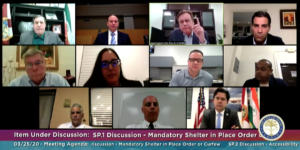 find another $1 mil to allocate to people under 60 who needed help with meals, ADLP insisted that he was right and that nothing else could be considered at the meeting. When Mendez said that it could be taken up under the discussion about the city manager’s progress report, during with Noriega could take directions from anyone, Diaz de la Portilla said they would have to vote to go back to that item. So he used two technicalities to try to keep needed food from needy families — even in his own district. How does this make sense?
find another $1 mil to allocate to people under 60 who needed help with meals, ADLP insisted that he was right and that nothing else could be considered at the meeting. When Mendez said that it could be taken up under the discussion about the city manager’s progress report, during with Noriega could take directions from anyone, Diaz de la Portilla said they would have to vote to go back to that item. So he used two technicalities to try to keep needed food from needy families — even in his own district. How does this make sense?
Ladra is glad that Russell, pressured hard to back down, didn’t and got a promise from everyone it would get done.
All these meal costs are more than likely reimbursable by the Federal Emergency Management Administration, anyway, and the city has about $74 million in reserves that they can dip into until they are reimbursed.
Read related: Miami Beach, Miami issue ‘shelter in place’ orders to curb, contain COVID19
Carollo particularly seemed willing to open up the reserve coffers after Budget Director Chris Rose said that the estimated loss of revenue for just one month — including the city’s share of sales tax and the loss of city service fees — would be about $17 million. “There’s a lot of variables,” Rose said. “This is one of the most difficult months to do a projection.”
Reimbursement can take months, as with the most recent hurricane, explained Carollo, sitting in a chair too small for him in a suit too big. “We have to plan,” he said, and when Crazy Joe talks, Hardemon and DLP look at their phones.
Suarez was kissing DLP’s ass again, like he has all week on radio. Thanking him for insisting on the meeting, the shelter in place order and the curfew.
Diaz de la Portilla leaned into the camera like he had a fight to pick with someone. Gave Ladra a little vertigo with that huge 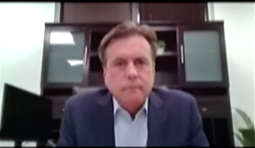 mueble about to fall on top of him. After Reyes and Hardemon expressed their concerns with the curfew, DLP became adamant that the exceptions be limited to people going to or coming from work, people going to medical appointments and people walking their dogs within 250 feet of their homes.
mueble about to fall on top of him. After Reyes and Hardemon expressed their concerns with the curfew, DLP became adamant that the exceptions be limited to people going to or coming from work, people going to medical appointments and people walking their dogs within 250 feet of their homes.
“We don’t want to create a county-like order with 37 exceptions,” he said in one of several digs at the county mayor, who has made several amendments and adjustments to his county orders. “We have to make it very clear we’re serious about this. We need to lead the nation. We need to act deliberately but swiftly.
“We can’t afford to wait anymore” Diaz de la Portilla said, in the same meeting where he said poor people under the age of 60 needed to wait a few days at least and up to a week or more before getting food relief.

